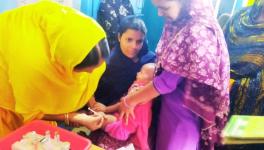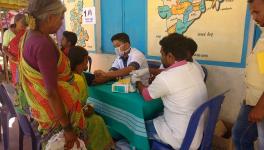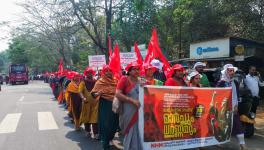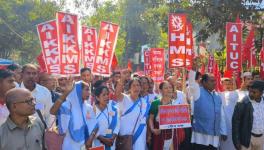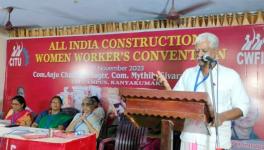How Indian Mothers have been Deprived of Rs. 84,000 Crores
Representational use only.
The Union government has denied millions of Indian women their legal right to maternity benefits worth Rs. 84,000 crores over the last seven years. In 2013, the National Food Security Act made a provision for maternity benefits to women. According to section 4 of this law, every pregnant and lactating mother is entitled to nutritious food and maternity benefits of at least Rs. 6,000, to be provided in instalments prescribed by the central government.
This legal commitment required an additional budgetary allocation. Presuming a population of 132 crores, a birth rate of 20 per thousand, and 90% coverage, the estimated annual budget for this scheme would be Rs. 14,000 crores, which is less than 0.05% of the GDP, and with disproportionately high benefits of protecting the health and nutrition of mothers and children.
Considering this, the government should have operationalised this legal commitment long ago. Even if the government started the scheme in financial year 2015-16, by now, the full benefits ought to have been rolled out. Therefore, during the seven financial years from 2015-16 to 2021-22, Rs. 98,000 crores would have been provided.
However, the actual expenditure on this legal obligation reveals that what was required for one year (Rs. 14,000 crores) has been spent over the last seven years, if not less. In other words, Indian mothers were deprived of Rs. 84,000 crores (Rs. 98,000 crores minus Rs. 14,000 crores) during these seven years. These Rs. 84,000 crores work out to an average annual expenditure of Rs. 12,000 crores per year or about US$ 1.5 billion.
The spending we have seen was primarily done under a scheme to implement this legal entitlement launched in 2017, the Pradhan Mantri Matru Vandana Yojana (PMMVY).
Hence, even after almost two years to prepare to implement this legal entitlement, negligible allocations were made during 2015-16 and 2016-17. In 2017-18, Rs. 2,700 crores were allocated, but the Budget Estimate was later reduced. The reductions grew even more in the following year. In 2020-21, the cut was extensive, from a budgetary allocation of Rs. 2,500 crores to just Rs. 1,300 crores.
When the government formulated detailed guidelines for the PMMVY in 2017, it ignored the original legal provisions for this entitlement. It restricted maternity benefits to the first surviving child and then reduced them to Rs. 5,000, instead of the legally-mandated minimum of Rs. 6,000, to be paid in three instalments.
Further, the procedure to avail the benefit was so complicated that many mothers found it challenging to access the scheme, particularly the poor and less-educated sections which need it the most. Sometimes, women who had home births or did not have an Aadhaar card or other relevant documents were denied the benefit. Several long forms have to be filled to access the provision, and documents such as the MCP (Mother-Child Protection) Card, the Aadhaar card of the mother and husband, bank passbook, and linking the bank account with Aadhaar are required. Even minor discrepancies in documents have led to a widespread denial of payment. The mother's application for maternity benefits depends on local functionaries such as the Anganwadi worker. Success depends on how much time they have to devote to a case with complications.
Even after every effort, online applications for payments can be rejected or returned with errors due to several factors. Or, the application may get accepted, but the payment can still get delayed. Sometimes, money is deposited in the wrong account. Getting such mistakes corrected is another challenge.
In implementing the maternity benefit component of the National Food Security Act, many injustices have taken place which requires urgent corrective measures. The arbitrary restriction of the scheme to only the first living child should be dropped in favour of all births. The government should also roll back the arbitrary reduction from Rs. 6,000 to Rs. 5,000. Remember that Rs. 6,000 is the minimum payment mandated by the law and requires revision with the inflation rate to retain the value of the benefit. It is an amount fixed eight years back and overdue for an upward correction. This provision requires an annual budget of at least Rs. 18,000 crores and it is highly justified, keeping the health benefits for mothers and children in view.
Benefits for such a crucial scheme should be available through a simplified process, and India especially needs to do away with the requirement for Aadhaar cards and linked bank accounts. Emphasis should be on ensuring the availability of the benefit instead of creating obstacles in the way of those who need it most.
The writer is honorary convener, Campaign to Save Earth Now. His recent books include Planet in Peril and Man Over Machine. The views are personal.
Get the latest reports & analysis with people's perspective on Protests, movements & deep analytical videos, discussions of the current affairs in your Telegram app. Subscribe to NewsClick's Telegram channel & get Real-Time updates on stories, as they get published on our website.











